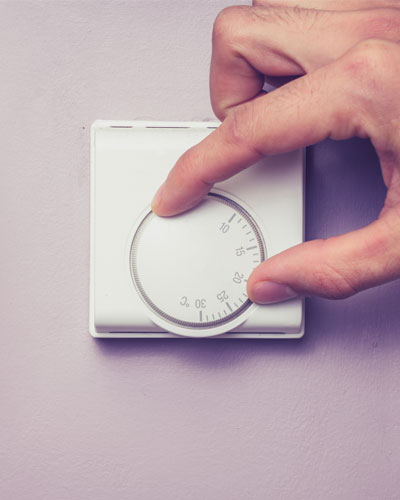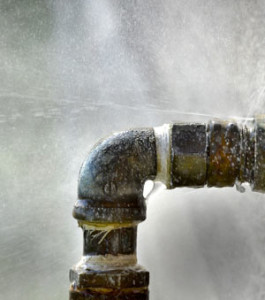With the nights drawing close, winter is well and truly here.

But rather than wait for the worst to happen, taking steps now will help keep you and your family comfortable in these coming months.
To help you do that, we’ve put together a few tips on how to prepare your home for the colder weather and stay safe in a home emergency.
1. Protect against leaks
It may seem obvious, but any little issue with your exterior walls or roof – such as a missing tile, a damp spot or a noticeable draught – are only likely to get worse as winter progresses. You can’t predict what emergency repairs may be needed around the home later on, but rather than allow an issue to become an incident, it makes sense to sort it out and save yourself the worry. Repairs will vary in price and the time they’ll take, but a small fix now should save you a big bill in the future.
2. Get your boiler and major appliances serviced
 Whilst many areas of your home can be sorted with a little elbow grease and DIY nous, a gas boiler is one feature of your home for which you should always seek assistance from a professional tradesman. Getting your boiler serviced will help identify any underlying issues which may later become a problem, and could ensure your warranty is maintained, depending on your manufacturer and the age of your boiler. Before getting a service, make sure your engineer is registered by checking the Gas Safe Register for free here.
Whilst many areas of your home can be sorted with a little elbow grease and DIY nous, a gas boiler is one feature of your home for which you should always seek assistance from a professional tradesman. Getting your boiler serviced will help identify any underlying issues which may later become a problem, and could ensure your warranty is maintained, depending on your manufacturer and the age of your boiler. Before getting a service, make sure your engineer is registered by checking the Gas Safe Register for free here.
3. Consider Boiler Breakdown Cover
When it comes to home emergencies, a boiler breakdown insurance policy will make sure you’re not caught out with costly repairs. Cover like this may vary in price, sometimes depending on the age of your boiler, but there are policies out there which will work out as cost-effective against the price of an emergency call-out to attend to your boiler breakdown. With winter just around the corner, this will be more important than ever, so see how our Home Emergency Cover can help – it provides cover for boilers of all ages and types, excluding solar-powered heating (contact your local solar installation expert for more information).
4. Improve the insulation of your home
Properly insulating your home can be one of the best changes you make in preparation for winter. Insulation should keep you comfortable by reducing heat-loss from your home, something you’d be very glad of if you were to experience a boiler breakdown. There are a number of areas in which you can improve the insulation of your home, such as in cavity walls, your loft, and the glazing of your windows.
Aside from the comfort factor, insulation can also save you a significant deal of money. Figures from Energy Saving Trust show that a detached home installing loft insulation of 270mm could save up to £240 on their fuel bill each year. Set against a typical installation cost of £395, you’d break even before the end of the second year. Depending on your circumstances, you may also be eligible for subsidised or even free insulation under the government’s Energy Company Obligations scheme. Just visit this page on MoneySavingExpert to find out more.
5. Prevent burst pipes
A functioning heating and hot water system is vital to ensuring your comfort in the home, but in winter, sudden drops in temperature can sometimes lead to pipes freezing up. This causes them to expand, which can in turn lead to a pipe bursting and flooding your home. It is therefore vital that you know where the stopcock (shut-off valve) is for your water so that you’re able to prevent any water damage.
To avoid the inconvenience of a burst pipe this winter, you may want to think about treating your plumbing in more vulnerable areas, such as in an outside wall or in an unheated crawl space. Plumbers will tell you that this can be done using foam insulation around the pipes, or by improving the flow of warm air through these areas using better ventilation or even a small heater – the ambient temperature in the area only needs to be slightly above freezing to prevent pipes from freezing up.
6. Clear out your gutters
With a wet and windy winter on the way, it’s likely that your guttering will soon be working overtime. Gutters are designed to allow rainwater to run away from the roof and down the drains, preventing it from cascading down your house, collecting in areas, and potentially causing damp. However, a build-up of debris and leaves can cause blockages which will compromise both the exterior and interior of your home. These blockages can occur either in the downpipe or on the gutters themselves, highlighting why regular maintenance is necessary.
Whilst it’s not a pretty job, cleaning your gutters is fairly straightforward. All that’s required is safe access to them – you’ll want a good, stable ladder – and some tool to scoop and clear out any sediment. This should be done at least once a year, preferably around autumn time and before heavier wet weather, but the more often you do it, the easier it will be to keep things clear and running smoothly. A blockage of the downpipe will be more difficult to address, requiring a wire cleaner through the length of the pipe to find and break up the blockage. When using any tools on your pipes and guttering, it’s important to make sure you don’t create any damage which may later cause an even greater issue. For this reason, your guttering repair may require assistance from a professional.
7. Create a home emergency kit
It may sound a little drastic, but preparing a set of tools and supplies in case of an emergency could turn out to be a very worthwhile use of your time indeed. Now we’re not suggesting you construct a military-style inventory of items – we’re only looking to brave winter, not World War 3 – but a simple kit should make your winter emergency that bit more bearable. Your home emergency kit could include:
- An electric torch and spare batteries, or even a wind-up lantern
- Matches or a lighter
- A simple tool-kit, including a hammer, nails, and both a cross-head and flat-head screwdriver
- A first aid kit
- A fan-heater, if the electricity is still operational, or a gas-heater, along with an adequate supply of gas
- LOTS of layers – blankets and duvets as well as jumpers and jackets
- Essential toiletries
- Any prescription medicines you and your family will need
- Sealed and non-perishable food, such as tinned soup
- A pack of cards and a board game or two
Yes, you read that last suggestion correctly – like it or not, today’s general mode of living is heavily reliant on electricity, so in the event of a power-cut, it’s important to keep your family adequately entertained. This is bound to make things more bearable, and may even turn into a great chance for real family bonding (read: vicious arguments about paying rent in Monopoly). The items listed here will all be more or less relevant depending on the home emergency you experience, but hopefully by covering each of the bases, you won’t get caught out.
The takeaway
The main issue to be wary of in winter is a boiler breakdown, so replacement measures for heating should be top of your list. Despite all your best efforts, sometimes a home emergency can’t be helped, but insuring against these situations will save you money and maintain your comfort. Home Emergency Cover provides emergency assistance if your boiler breaks down, and will also help with many other areas of your home, such as a roof leak, a plumbing problem or much more.
